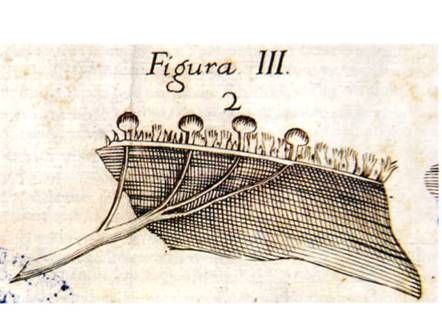Marcello Malpighi (continued)
The tension within the Bolognese academic circle did not die down and Borelli convinced Malpighi that it would be best to leave Bologna for Messina, where Borelli had found him a very well-paid post at the University. In Messina Malpighi continued with his enormous task aimed at revealing the microscopic structure of the organs of living beings. In 1665 he published the three papers De lingua, De cerebro and De externo tactus organo, about the sense of taste, the working of the brain and the sense of touch.

|
Fig. 1: The fungiform papillae of the tongue with their innervations. In order to investigate the "hidden machinery" of the sense of taste, Malpighi enrolled the help of his cook. Following the instructions for a traditional Bolognese recipe, he removed the first two layers of the surface of the tongue and revealed a papillary body and three types of papillae which, through the pores of the upper layers, are reached and stimulated by the particles of saliva. He thus demonstrated that the sense of taste works like the sense of touch, and that both are based on the reception of mechanical stimuli. |
Another clamorous success for iatromechanics came in the following
year with the publication of De viscerum structura, in which Malpighi showed evidence of the complex system of follicles,
tubules and vessels in the kidneys and developed a new model of the process of secretion.
But Malpighi could not resist for long in Messina, and in 1666 returned to his beloved Bologna to teach Practical
Medicine. He became a sought-after doctor and, consequently, had a comfortable lifestyle.
The following years were of particular importance in the life of Marcello Malpighi because they saw the end
of his friendship with Borelli and the beginning of a collaboration with the Royal Society of London,
which from 1669 onwards published all his works. Both these events strengthened Malpighi's
scientific autonomy. Although he remained faithful to the microscope and iatromechanics, he further
extended his field of research: to insects (1669: De bombyce), to embriology (1673: De formatione pulli in ovo)
and to plants (1675/1679: Anatomes plantarum), opening up new ways forward in all these areas.
He only surrendered in the face of minerals.
In 1686/87 the Royal Society published Malpighi's Opera omnia but, despite his
increasing fame on an international level, opposition in Bologna did not weaken.
The value of Malpighi's work was put in doubt and ridiculed by the botanist Giovannni
Battista Trionfetti, the archdeacon Anton Felice Marsili and his eternal enemies Paolo Mini and
Giovanni Girolamo Sbaraglia. Furthermore, a fire in 1683 which destroyed his town-centre house and
all his instruments and manuscripts, together with worsening health problems, also contributed to
casting a shadow over his life.
Malpighi wrote a letter in 1688 describing a violent incursion on his home by Sbaraglia and some of
his students, which half-destroyed his house in Corticella on the outskirts of Bologna. However,
this was probably not a real event but rather an allegorical account which Malpighi had invented
following the verbal harassment received in De recentiorum medicorum studio dissertatio epistolari
ad amicum. In this libel, the anonymous author (probably Sbaraglia) attacked Malpighi and put in
doubt the the usefulness of science and the microscope in medicine.
In 1691 Pietro Antonio Pigatelli, a cardinal linked to Bologna, was elected Pope Innocent
XII. He wanted his Bolognese friend Malpighi as
archiater![]() in Rome. Malpighi did not succeed in refusing this request for long. He was nominated "cameriere segreto
partecipante", a title which was the equivalent of the clerical status of Monsignor, and was received
in Rome with the highest honours.
in Rome. Malpighi did not succeed in refusing this request for long. He was nominated "cameriere segreto
partecipante", a title which was the equivalent of the clerical status of Monsignor, and was received
in Rome with the highest honours.
Nonetheless, Malpighi lived through this forced transfer with bitterness and sadness. Three years later,
on 19 November 1694, he died of an apopleptic fit. Three years later, his Opera posthuma was published.
Nothing describes Malpighi's innovative work better than the judgement of one of his contemporaries: "alter microcosmi Columbus, non unum tantum, verum innumeros novos orbes in sola viscerum structura detexit" ("another Columbus of the microcosmos, he discovered not just one but numerous new worlds, all in the structure of the internal organs").
|
|
(Marcello Malpighi - page 3 of 3)
< Back | |
